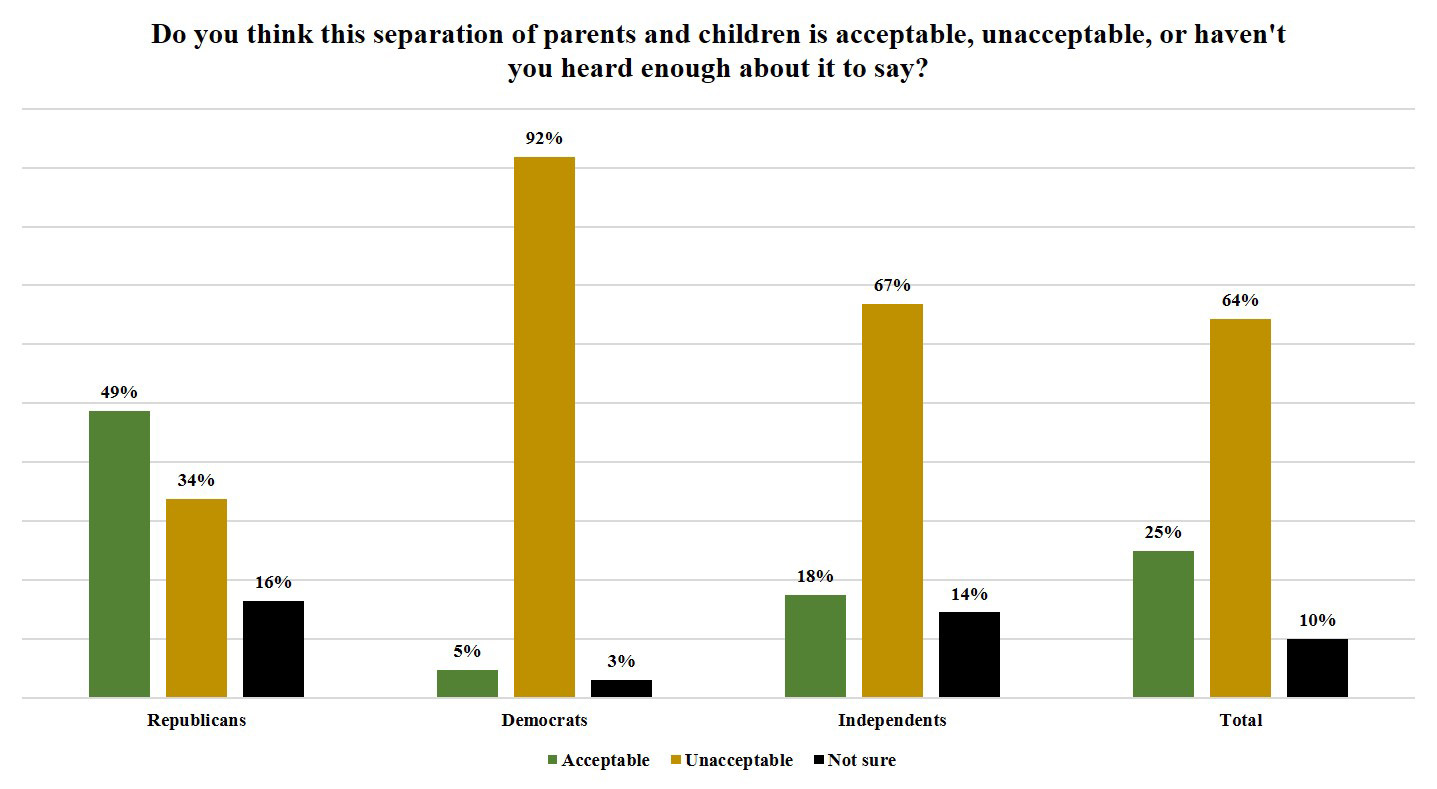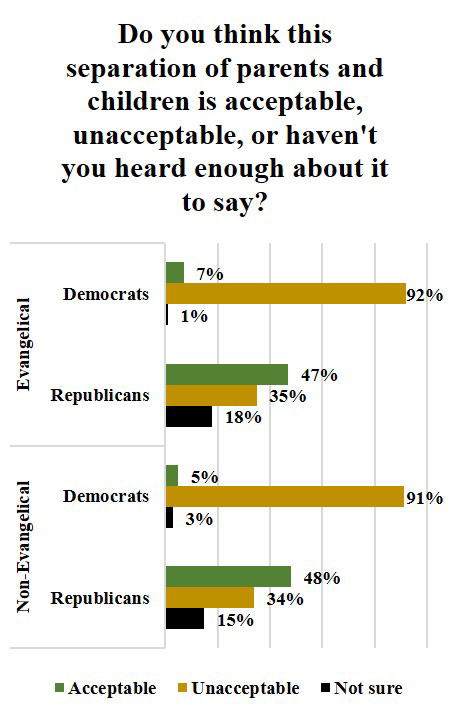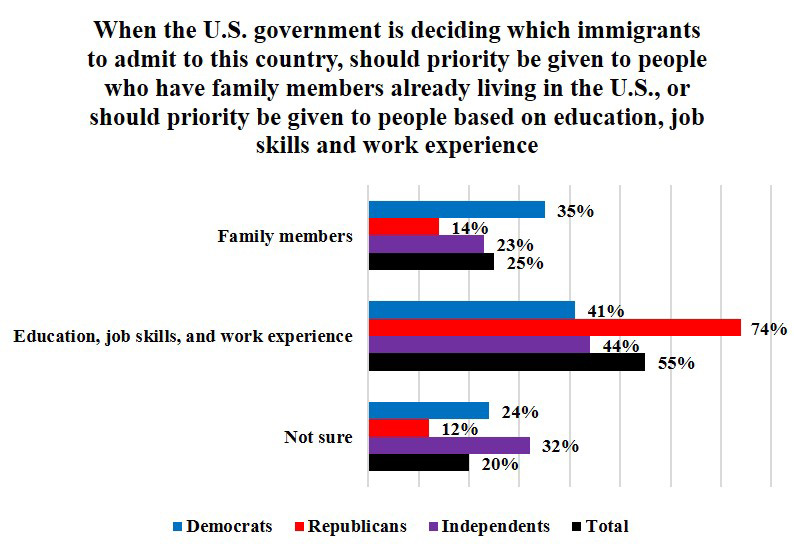New UMD Study Reveals American Public Attitudes on Complex Immigration, Refugee Issues
Study finds that nearly two-thirds of American respondents oppose family separation, but a majority of 'strong' Republicans support the practice
A new UMD study directed by Professors Shibley Telhami and Stella Rouse, based on data from the University of Maryland Critical Issues Poll, sheds light on American attitudes toward policies and scenarios related to immigration and refugees.
While immigration policy remains a polarizing issue, a majority of Americans oppose the practice of family separation at the U.S.-Mexico border, but a majority of 'strong' Republicans find the practice acceptable.
Overall, 49% of Republicans said family separation is acceptable, and 34% said it was unacceptable. Among Democrats, 92% said family separation is unacceptable, and 5% said it was acceptable.

On the issue of family separation, partisanship trumps faith on evangelical responses, as evangelical and non-evangelical Democrats and Republicans answer at almost identical rates. For example, 92% of evangelical Democrats find the practice unacceptable, and 91% of non-evangelical Democrats feel the same. The same trend is seen when comparing Catholics to those who are not religious.
“One notable result on the issue of family separation is that partisanship weighs much more heavily than faith on evangelical responses as evangelical and non-evangelical Republicans and Democrats answer at nearly identical rates,” said Professor Shibley Telhami, Principal Investigator and Director of the Critical Issues Poll.

Respondents value education/job skills of immigrants over immigrants’ family connections
When asked if the U.S. government should give priority to immigrants who have family members already living in the U.S. or if priority should be given based on education, job skills, and work experience, a majority of Americans who responded to the survey (55%) answered that education, job skills, and work experience should be given priority, with 74% of Republicans selecting this answer. Pluralities of both Democrats and independents also answered this way.
“Our findings that immigrants with education, job skills, and work experience should be given priority by the U.S. government over those with family members already in the country is one of the few issues in our survey that transcends partisanship lines. A majority of Republicans and pluralities of Democrats and independents answered that the former should be prioritized over the latter,” said Associate Professor Stella Rouse, Principal Investigator and Associate Director of the Critical Issues Poll.
The value placed on the capacity of immigrants to make a contribution to American society could be rooted in economic concerns. Compared to a poll conducted by the Sadat Chair in 2016, Americans are now more concerned about the economic burden of refugees than they are about terrorism (52% vs. 31%). In 2016, those numbers were 41% and 46%, respectively.

Responses show acceptance of Middle Eastern refugees has grown since 2016
Respondents in this 2019 poll are eight percentage-points more likely to think that refugees from the Middle East (Syria in 2016) would be welcomed in their state or community, compared to respondents in 2016.
Over the past three years, Republicans have become more likely to say that refugees from the Middle East would be welcomed (55% in 2019 compared to 48% in 2016). This is also true for Democrats—who are 10 percentage-points more likely to feel this way in 2019—and independents, who also experienced an eight percentage-point increase.
On the other hand, Americans have become less open to refugees from the Middle East specifically during the last three years (30% to 23%). When compared to other regions of the world, including Central America, Africa, and East Asia, Americans’ degree of openness toward refugees from the Middle East was the lowest (only 23% selected options around ‘being very open’). This is a seven percentage-point drop from 2016.
The poll addressed a number of other issues related to immigration and refugees ranging from the building of a border wall at the southern border, primary sources for political information, and estimations of refugee arrests over terrorism charges.
To access the full report, please click here.
About the Survey Methodology
The survey was carried out March 15–April 2, 2019 online from a nationally representative sample of Nielsen Scarborough’s probability-based panel, originally recruited by mail and telephone using a random sample of adults provided by Survey Sampling International. The poll was conducted among a national poll of 3,015 respondents, with a margin of error of +/- 1.78%. Overall, the sample was adjusted to reflect population estimates (Scarborough USA+/Gallup) for Americans. The survey variables balanced through weighting were: age, gender, race/ethnicity, household income, level of education, census regional division, and political party affiliation.
Access the survey methodologies of the other polls listed in this report.
About the UMD Critical Issues Poll
The University of Maryland Critical Issues Poll probes domestic and international issues that are central for our policy discourse. Professor Shibley Telhami serves as the Director of the Critical Issues Poll, and Associate Professor Stella Rouse serves as its associate director.
Published on Mon, Jul 22, 2019 - 9:53AM



